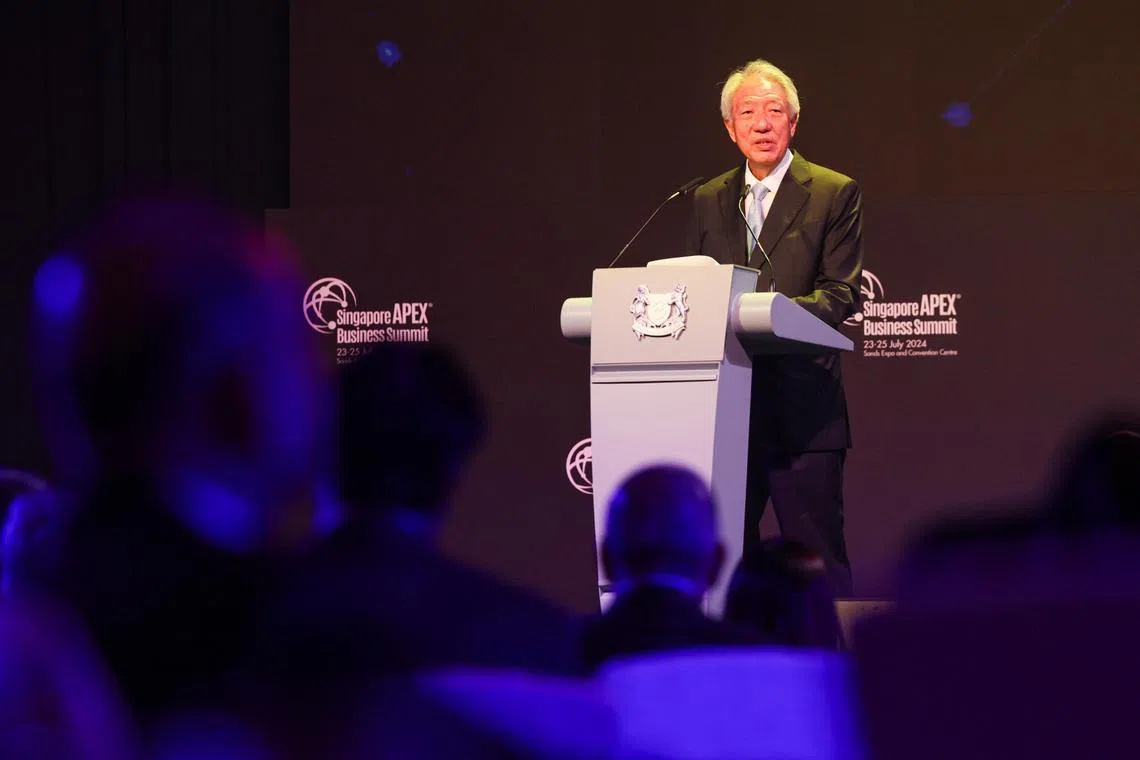Firms future-proofing by operating on ‘just-in-case’ basis amid global disruptions: SM Teo
Sign up now: Get ST's newsletters delivered to your inbox

Senior Minister Teo Chee Hean speaking at the Singapore Apex Business Summit on July 24.
ST PHOTO: GIN TAY
SINGAPORE – Businesses and governments are increasingly operating on a “just in case” basis in an uncertain global environment, said Senior Minister Teo Chee Hean on July 24.
His remarks, made on the second day of the Singapore Apex Business Summit, referred to firms future-proofing their businesses and diversifying to ride out disruptions to supply chains and prepare for climate change.
The summit, now in its second edition, aims to address mounting business challenges such as disruptions to trade and supply chains.
SM Teo, who is also Coordinating Minister for National Security, said at the event, held at Sands Expo and Convention Centre: “Acute disruptions to supply chains have turned many of our long-held economic assumptions on their heads.
“Although the pandemic is over, other disruptions persist, not least in the form of two brutal wars in Europe and the Middle East.”
He added that climate change will also disrupt economic activity as it amplifies the frequency and severity of natural disasters.
Countries have also turned away from free trade, putting up barriers and “decoupling” for national security reasons or to protect their own industries, SM Teo said.
These trends all mean that business-as-usual has ended. Instead, firms and governments now operate more on a “just in case” basis, rather than “just in time”, he noted.
“Just-in-case” means diversification of the entire business, including markets, products, the locations of facilities, and even the people that businesses hire, he said.
“Expanding into new markets can mitigate localised economic downturns and sudden restrictions in market access. Establishing production facilities across different regions can help to reduce concentration risk and supply disruption.”
HSBC signed an agreement with the Singapore Business Federation (SBF), which organises the annual summit, to give Singapore businesses more support in seizing opportunities in India, the Middle East and the Greater Bay Area, which covers Guangdong in China, Hong Kong and Macau.
HSBC Singapore chief executive Wong Kee Joo said in a statement: “Local businesses form the bedrock of the Singapore economy. For these businesses to thrive, it’s important that they are plugged in early to the global trade flows that we see emerging from under-tapped markets, especially in India and the Middle East.”
HSBC also launched a guide providing companies with insights into six major markets in Asean, and the key trade corridors of the Greater Bay Area, India and the Middle East. This will help firms to take the first step in venturing overseas.
SBF chief executive Kok Ping Soon added that the Indian and Middle Eastern markets present opportunities in areas like component manufacturing, semiconductors, automobile manufacturing, in particular electric vehicle solutions, and energy and renewables.
Besides expansion, SM Teo said “just-in-case” also means future-proofing companies, especially against climate change risks and sustainable regulatory requirements.
“It has become crucial for businesses to have a decarbonisation strategy, and to begin pricing carbon in their business decisions as a way to reflect carbon tax. All sectors of the global economy will be impacted in some way or other.”
He added that governments can take measures to help shape a more resilient business environment regionally and globally, such as complementing the global trading system with regional and cross-regional agreements.
Governments can also create partnerships in new domains such as the digital and green economies.
“The digital economy has tremendous potential for growth. In Singapore, the digital economy was 17.3 per cent of our gross domestic product in 2022, up from 13 per cent in 2017, with its growth outpacing that of the overall economy,” SM Teo said.
Singapore is pursuing digital economy agreements with partners to align cross-border data policies and establish common digital trade rules.
It has also signed agreements with countries such as Australia, Britain and Japan that support economic growth and jobs in green sectors, while encouraging decarbonisation.
Singapore is also helping to lay the foundation for new infrastructure to support regional trading and resilience, SM Teo said.
For example, it is putting together the building blocks for an Asean power grid that will improve regional resilience in power supply, especially green power.
The Government has granted conditional approval for 4.2 gigawatts of low-carbon electricity imports, and is already importing power in a project involving four Asean countries.
But SM Teo noted: “These projects are still in their infancy in our region ... so we can expect to face hurdles from time to time, even as progress is made.”
The Government is also expanding cross-border digital payment infrastructure, working on a single common system with India, Malaysia, Thailand and the Philippines.
But importantly, even in a time of turmoil, Singapore continues to be a reliable and efficient hub for business, SM Teo said, noting: “We maintain links and build ties with everyone. So in this time of turmoil and uncertainty both within countries, and between countries and regions, we remain an oasis of calm and stability, consistency and reliability.
“These attributes are at a premium when businesses are looking for a place where they can find safe harbour and reduce their risks. We provide a secure base from which to venture forth into more troubled waters.
“So, do remember to protect, preserve, strengthen our base, and never take it for granted, and never put it at risk.”



